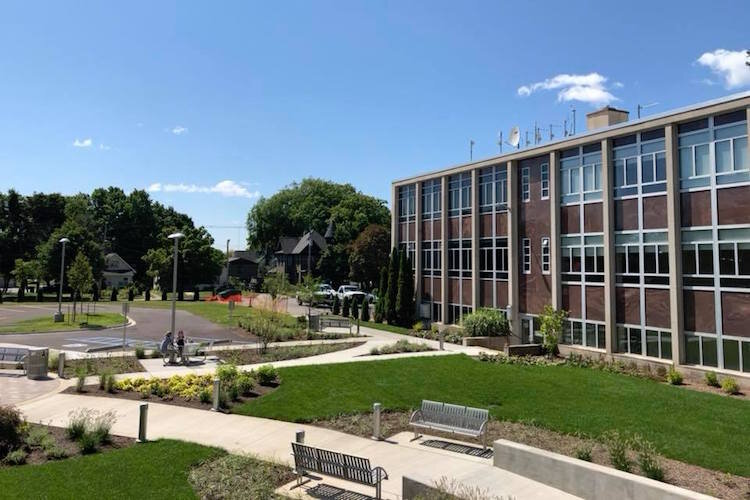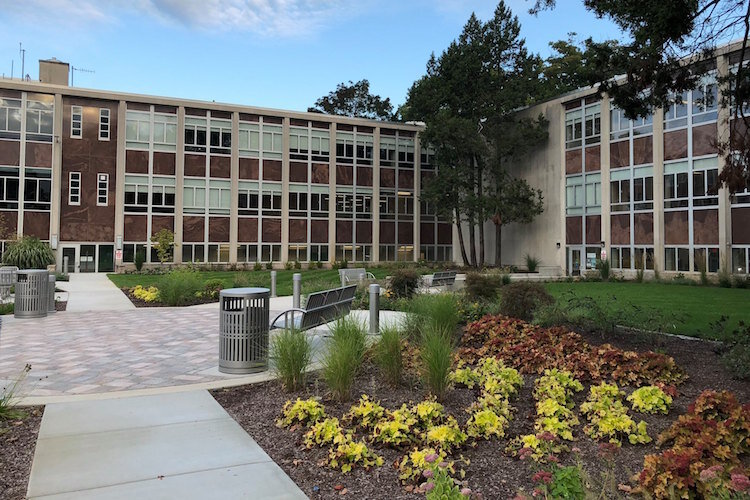A hotel room for those with COVID-19 symptoms or who test positive and have no place to stay
Some of those with COVID-19 symptoms don't have a place to self-isolate. Calhoun County has come up with a solution — hotel rooms.
Editor’s note: This story is part of Southwest Michigan Second Wave’s On the Ground Battle Creek series and our ongoing COVID-19 coverage. If you have a story of how the community is responding to the pandemic please let us know here.
To address the needs of vulnerable communities in Calhoun County takes some creative solutions, the latest of which is the use of a hotel to house individuals who must be in isolation or quarantine because of the coronavirus.
The rooms are available to individuals who have been tested and are awaiting results and those who tested positive but don’t have symptoms.
On Tuesday, April 14, Calhoun County Commissioners formally approved a contract between the County and a Hampton Inn on Riverside Drive during a regularly scheduled meeting. The hotel also will take in individuals from Kalamazoo County, which has entered into an agreement for these services.
Kelli Scott, Calhoun County Administrator, says it will cost the County about $100,000 per month to rent out the entire hotel property which includes 63 rooms. For the duration of the one-month contract, the property will be closed and unavailable to travelers seeking to rent a room.
“This location was chosen after a lot of discussion about what is needed to keep people safe and the ability to get them wraparound services to keep everybody safe and to have medical staff check in on them,” Scott says.
Scott says the Centers for Disease Control have strict guidelines for municipalities regarding non-medical sheltering in place activity and the individuals, some of whom may be homeless and residing in shelters and need to be monitored and isolated.
“We have a large number of people in households where it makes it impractical for them to shelter in place because there are a lot of people in that house,” Scott says.
But this new housing option has its limits. “You can’t have someone say they want to stay there because they don’t want to stay at home. There has to be a proven necessity, validated by public health officials, and it has to be on orders from public health officers and nurses who need to determine that sheltering at home is not practical,” Scott says. “It does depend on the medical necessity, reducing the risk, and preventing the spread.”
The hotel option also frees up space at hospitals. Scott says that as COVID-19 cases increase and hospitals hit a threshold, there will be more urgency to have only those people in hospitals who must to be there. (As of Monday, April 13 Calhoun County reported 83 cases and two death attributed to COVID-19.)
“Hospitals would like to release people who don’t require further care there to give the space to someone who needs it,” Scott says. “Once the hospital has determined that individuals are healthy enough to be discharged they have the option of being brought to the Hampton facility.”
Rooms at the Hampton Inn in Battle Creek are being made available to individuals in counties throughout the region who meet the criteria, in addition to Calhoun County residents. This past weekend two individuals – one each from Calhoun and Kalamazoo counties – took up residence at the hotel.
“The ability to partner with our other local public health departments has been a great tool in addressing the needs of our homeless and shelter residents in Kalamazoo,” says James A. Rutherford, MPA, Kalamazoo County’s Health Officer/Director, Health & Community Services Department. “When one of our homeless residents who is residing in a shelter exhibits symptoms of COVID-19, after being tested, they may need to either isolate or quarantine out of the shelter for a given length of time.
“This partnership allows several contiguous health departments in Southwest Michigan the ability to harness our resources and support services and provide the necessary sheltering options to our most vulnerable residents.”
Scott says the County has entered into a legal agreement, similar to a sublease, to reserve a certain number of rooms for people from Kalamazoo County, which will pay a proportionate share of the cost to have these rooms.
“The counties that want to use our center will cover our actual costs and share in the FEMA reimbursement,” Scott says. “Other counties will need to have authorization for a person to be in isolation or quarantine. Our nursing staff will meet with those individuals.”
Those who enter into isolation and quarantine must agree to abide by certain rules, which include not leaving their rooms. For the duration of the contract, the hotel will operate with a skeleton staff, including management and front desk staff who have received training on how to keep themselves safe. Personal and hotel laundry services, janitorial services, meal delivery, and security are being provided by outside organizations that are under contract with the County.
Discussions about the idea of using a hotel had been underway for two weeks prior to the April 14 County Commission meeting. The hotel was able to be used as a COVID-19 housing site before the formal vote because Scott has been given authority to sign contracts and enter into agreements on an emergency basis.
The Federal Emergency Management Agency (FEMA) will reimburse up to 75 percent of the cost incurred by Calhoun County and other municipalities that will be using the rooms. Scott says the remainder may be paid through state and federal emergency response funding.
“There are several new state and federal funding initiatives that are up in the air,” Scott says.
The County’s Health Department has received a few hundred thousand dollars through federal funding to the Michigan Department of Health and Human Services that has been earmarked for response costs. Scott also has applied for funding from a relief fund established by the United Way of the Battle Creek and Kalamazoo Region.
“We’re hopeful that the state and the federal government will cover the response costs,” Scott says, adding that she also hopes the emergency response won’t require taxpayer dollars.
The partnership between the hotel and Calhoun County is another example, she says, of how quickly and effectively the Joint Operations Center is addressing ever-changing needs resulting from the coronavirus’ impact. The Joint Operations Center includes representatives from the county, the city, and law enforcement who hold twice-daily phone briefings and a broader weekly call.
As fears among residents grow, Scott says it’s important to make the most up-to-date and accurate information available.
“Members of the JOC are hearing from each other about how the needs are evolving,” she says. “We have processes in place to streamline the procurement and delivery of services to meet those needs.”



















